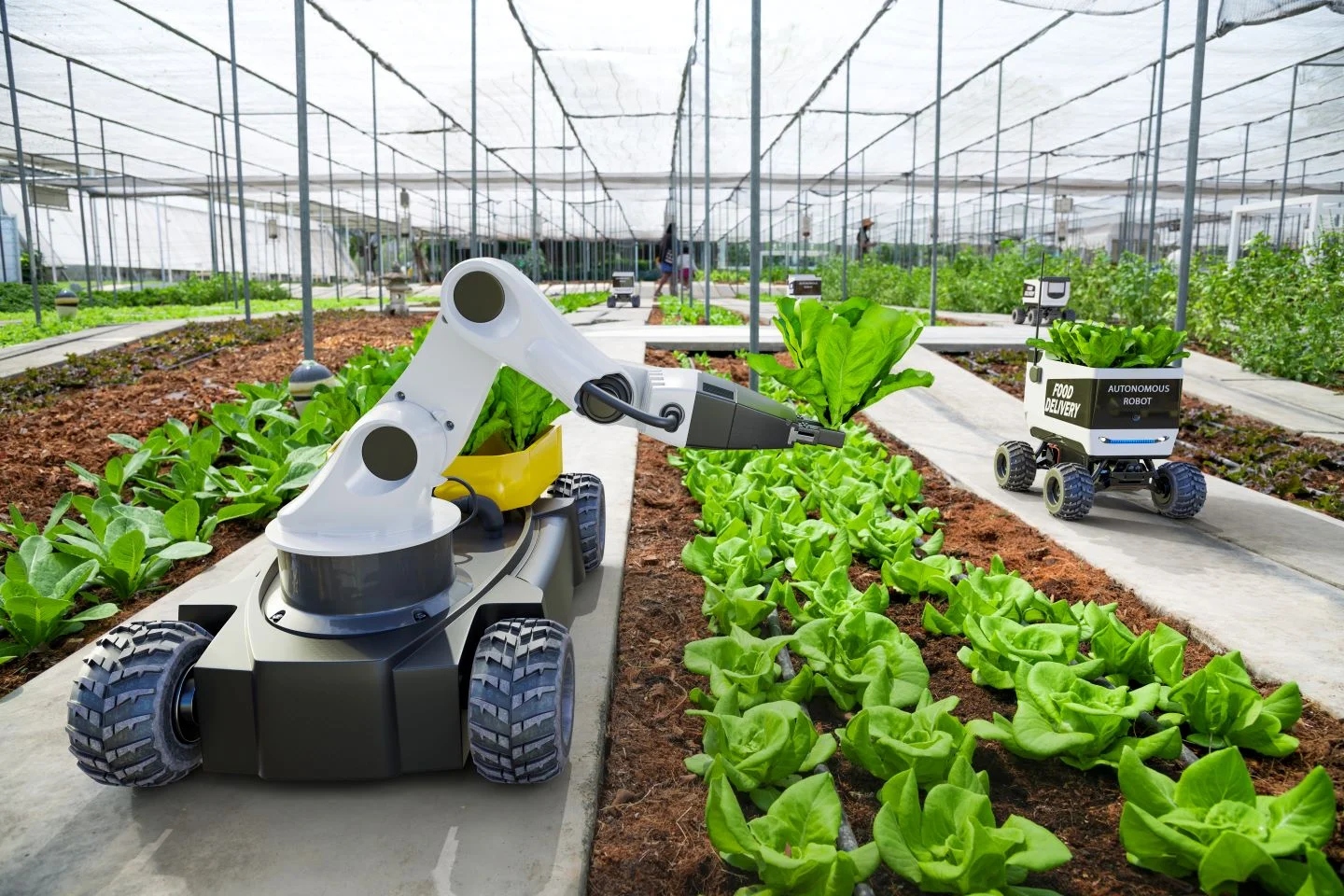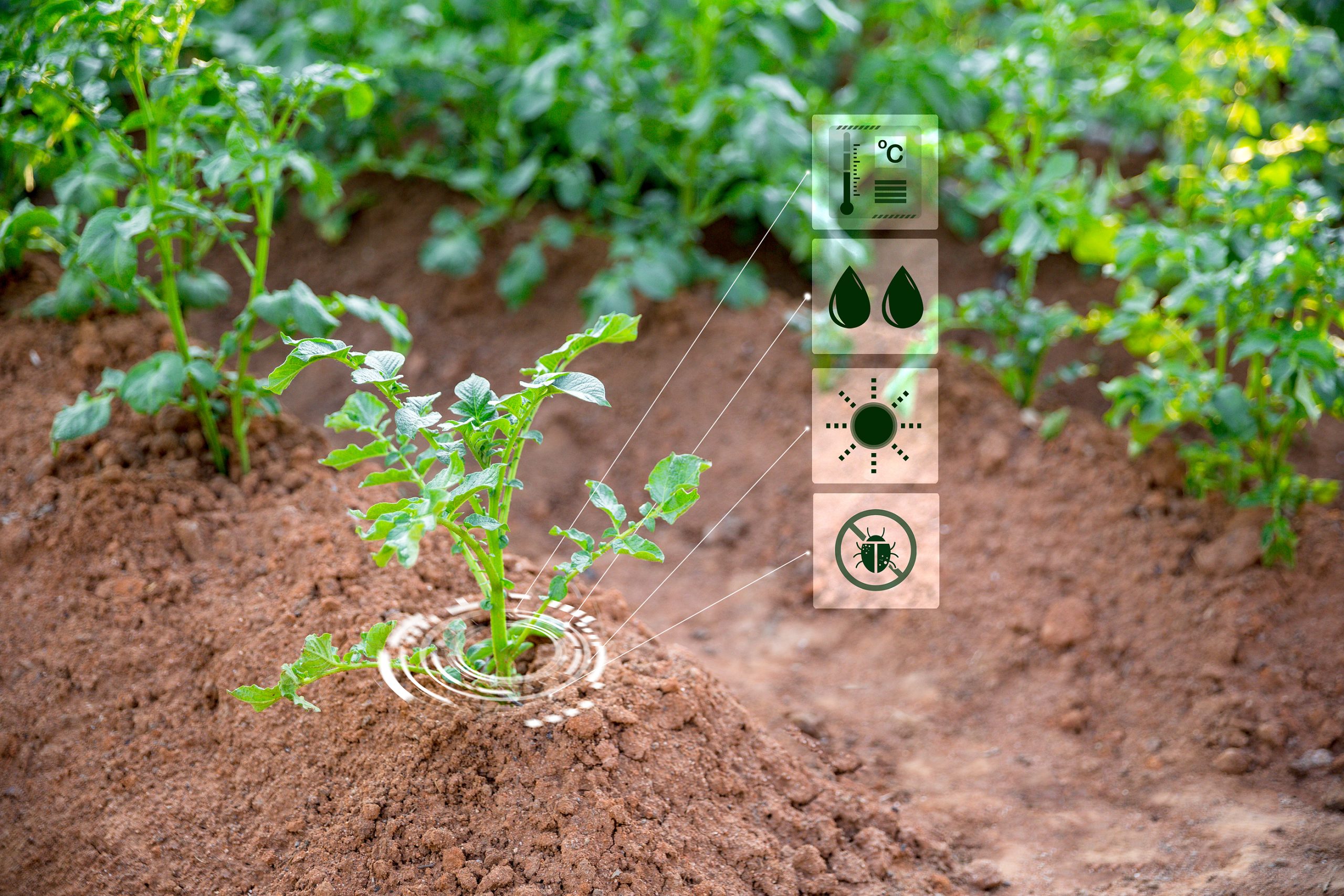Comments
- No comments found

The world population is growing and will continue to do so — it’s a Hard Trend future certainty — and with this rapid expansion comes the need for more sustainable farming practices.
With climate concerns, increased cost of resources, and lack of space in urban settings, growing food for the ever-expanding population is already proving to be a difficult task.
For hundreds of years, farming has been ruled by uncertainty. Farmers had to contend with unpredictable weather patterns, possible pest infestations, plant disease, fluctuating market demands, and more. Traditional farming methods often relied on experience and intuition, leaving much to chance.
However, in the face of modern challenges within the agricultural industry, these approaches are no longer sufficient.
The integration of artificial intelligence (AI) in agriculture is revolutionizing the way farmers cultivate and manage their crops. One of the most significant benefits of AI is its ability to enhance crop yield and quality. By leveraging machine learning algorithms and computer vision, AI can analyze data from various sources, such as soil sensors, weather stations, and drones. This data provides farmers with actionable insights on optimal planting, irrigation, and harvesting strategies, leading to increased crop yields, reduced waste, and improved resource allocation.

Moreover, AI is a powerful tool for promoting sustainable agriculture practices. By optimizing the use of natural resources like water and fertilizers, AI helps reduce the environmental impact of agricultural production. Precision agriculture, powered by AI, enables farmers to adopt more efficient and targeted approaches to crop management, significantly reducing the need for chemical pesticides and herbicides. This not only benefits the environment but also ensures healthier produce for consumers.
In essence, AI is transforming agriculture into a more efficient, productive, and sustainable industry. By harnessing the power of artificial intelligence, farmers can achieve higher crop yields, better resource management, and a reduced environmental footprint, paving the way for a more sustainable future in food production.
With an Anticipatory Mindset, you have the power to leverage Hard Trends and Soft Trends to help predict future disruptions and transform them into opportunity. There are plenty of Hard Trends and Soft Trends in today’s world that directly affect farming practices. Let’s look at a few of each:

Anticipatory farming practices, such as the integration of AI and robotics, contribute significantly to future agricultural resilience by enhancing productivity and sustainability.
Agricultural businesses are leveraging AI to adapt to market changes and improve productivity.
The thing to remember about Soft Trends is that they are not set in stone! They are future possibilities that we have the power to influence to our advantage. Can our society keep up with growing food demand by using the Hard Trend of accelerating digital technology? Can we make fresh produce more easily available to those that live in cities?
The answer is a resounding yes! In fact, some innovative farmers are already taking steps to equip their farms with AI and Machine Learning.
Farming has been around since the dawn of civilization, relying on guesswork and intuition. Conversely, AI applications have only been on our radar for the past few years, changing the way we work, create content, and more. As AI is altering almost every part of our lives, it is only natural to believe that this disruptive technology can possibly change how we farm, as well.

Zordi - Zordi is an agricultural startup that began in 2020. It uses advanced robotics to plant and harvest strawberries in western New York. Zordi implements AI and machine learning to monitor the strawberry growing process while controlling the greenhouse environment. This not only facilitates more fruit production on faster timelines but also more successful harvests. Co-founded by a robotics expert and a sixth-generation farmer, the company is using their combined expertise to change the way we grow produce.
Chengdu - The city of Chengdu uses vertical farming to quickly produce food for a large population in an area where land is scarce. This vertical farm resides in an older building that has been transformed into a plant farm. What is really remarkable is that this vertical farm uses an AI-based control system to accelerate the breeding and growing process of produce. With precisely regulated artificial lighting and a nutrient supply system operated by AI applications, the Chengdu facility can produce a full harvest of lettuce every 35 days!

AI institutes, such as Iowa State University's AI Institute for Resilient Agriculture, are playing a crucial role in advancing agricultural technology. These institutes are addressing critical agricultural challenges through innovative AI-driven tools and practices, preparing students and the industry for a future impacted by climate change and labor shortages. Additionally, sustainability institutes are promoting sustainable agricultural practices through AI and robotics, bridging technology and agriculture to drive student interest and industry engagement.
While these previous two examples are pioneering food innovations in controlled environments, AI is also transforming how we grow on more traditional farms.
As previously stated, farming is more than just growing crops. It requires making an abundance of decisions in unpredictable environments. Successful decision-making in agriculture requires data. From monitoring soil composition and spraying pesticides and herbicides to managing livestock health and using sensors and GPS technology in farm equipment, there is quite a bit of data farmers have access to.

But where decision-making in agriculture used to be rooted in uncertainty, AI technology and the efficient gathering of data make it easy to root decision-making in certainty.
Predictive analysis with AI grants farmers insights into all aspects of their farming process in real time. This includes detecting crop diseases and pests before they can destroy crops, monitoring soil health and moisture levels, predicting market trends, and more. A company called CattleEye even uses AI and machine learning to monitor livestock health and the impact diet and environment has on those animals! AI technologies also enhance crop health monitoring and management, addressing issues related to pests, diseases, and nutrient management.
AI applications have the ability to transform the world of agriculture by providing precise, data-driven insights that enhance both productivity and sustainability. Real-time monitoring systems track soil health and crop growth, while automated machinery handles planting, watering, and harvesting crops.
With technology-driven tools and insights at their disposal, farmers are more prepared to face the challenges posed by a growing population, climate change, and other problems that were often previously viewed as unsolvable.
While AI holds immense potential to revolutionize the agriculture industry, several challenges need to be addressed to fully realize its benefits. One of the primary challenges is the lack of standardization in agricultural data. This inconsistency makes it difficult to develop and deploy AI models that can be universally applied across different regions and crops. Additionally, significant investment in infrastructure, including high-speed internet connectivity, sensors, and drones, is required to support the widespread adoption of AI in agriculture.

Despite these challenges, the opportunities for AI to transform the agriculture industry are vast. AI can play a crucial role in addressing food security by increasing crop yields and reducing waste. By enabling more sustainable agriculture practices, AI helps minimize the environmental impact of agricultural production. Furthermore, AI can enhance the efficiency of agricultural supply chains, reducing costs and improving the quality of food products.
The potential for AI to drive positive change in the agriculture industry is undeniable. By overcoming the existing challenges, we can unlock the full potential of AI, leading to a more efficient, sustainable, and resilient agricultural sector.
While farming may have come a long way in the few years that AI applications have been on the rise, the future will still pose challenges.
AI plays a crucial role in enhancing the efficiency and integration of the food supply chain, from agricultural production to product development, aiming to improve innovation and decision-making at various stages.
For one, many farms do not have the infrastructure to support the bandwidth and processing power required to run AI applications at full capacity. This is a critical element that we need to get in place before we can make world-wide agriculture change.
Second, as AI is still in its fledgling stages, implementing AI applications on all farms would be costly. With an ever-fluctuating economy, there are many farmers who are merely trying to keep their heads above water with rising costs and market demands.

As much as I teach being Anticipatory, these are not challenges for the future — they are challenges for right now. But believe me when I say this: There is an Anticipatory thinker out there at the moment solving these problems, just as Anticipatory thinkers have already leveraged AI applications to start transforming the world of agriculture as a whole.
While the road ahead may present various obstacles, the promise of AI in agriculture is clear. By leveraging an Anticipatory Mindset and using the future of technology today, we can locate the opportunity that AI in farming presents, creating a world where fresh and sustainably produced food is available to all. AI technologies optimize and forecast demands within the agricultural sector, streamlining the supply chain process for efficient resource distribution, reducing waste, and enhancing decision-making from production to market delivery.
The integration of AI in agriculture has the potential to transform the way farmers cultivate and manage their crops. By leveraging machine learning algorithms and computer vision, AI can enhance crop yield and quality, promote sustainable agriculture practices, and improve the efficiency of agricultural supply chains.
While there are challenges that need to be addressed, the opportunities for AI to transform the agriculture industry are significant. As the global population continues to grow, it is essential that we adopt innovative solutions like AI to ensure food security, sustainability, and environmental stewardship.
By embracing the power of artificial intelligence, we can create a future where food production is more efficient, sustainable, and resilient, ensuring that fresh and nutritious food is available to all.
Daniel Burrus is considered one of the world’s leading futurists on global trends and innovation. The New York Times has referred to him as one of the top three business gurus in the highest demand as a speaker. He is a strategic advisor to executives from Fortune 500 companies, helping them to accelerate innovation and results by develop game-changing strategies based on his proven methodologies for capitalizing on technology innovations and their future impact. His client list includes companies such as Microsoft, GE, American Express, Google, Deloitte, Procter & Gamble, Honda, and IBM. He is the author of seven books, including The New York Times and Wall Street Journal best-seller Flash Foresight, and his latest book The Anticipatory Organization. He is a featured writer with millions of monthly readers on the topics of innovation, change and the future and has appeared in Harvard Business Review, Wired, CNBC, and Huffington Post to name a few. He has been the featured subject of several PBS television specials and has appeared on programs such as CNN, Fox Business, and Bloomberg, and is quoted in a variety of publications, including The Wall Street Journal, Financial Times, Fortune, and Forbes. He has founded six businesses, four of which were national leaders in the United States in the first year. He is the CEO of Burrus Research, a research and consulting firm that monitors global advancements in technology driven trends to help clients profit from technological, social and business forces that are converging to create enormous, untapped opportunities. In 1983 he became the first and only futurist to accurately identify the twenty technologies that would become the driving force of business and economic change for decades to come. He also linked exponential computing advances to economic value creation. His specialties are technology-driven trends, strategic innovation, strategic advising and planning, business keynote presentations.
Leave your comments
Post comment as a guest